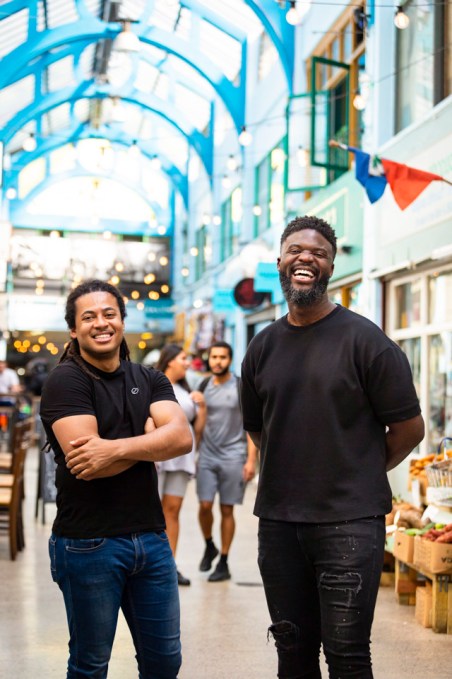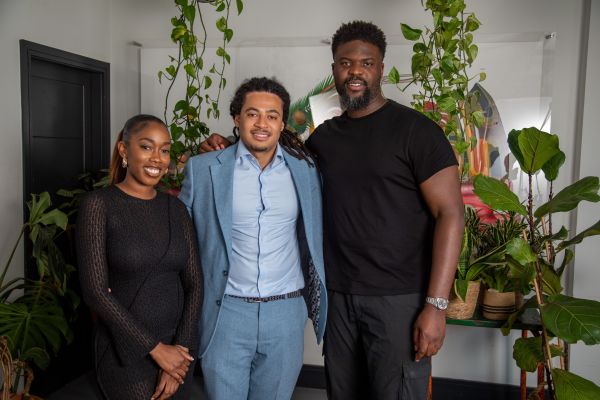British early-stage venture firm Black Seed has raised £5 million ($6.2 million) as part of its inaugural fund to solely support Black founders in the country. The round was led by asset manager M&G Investments, with additional support from Atomico and Molten Ventures. The firm is hoping to raise an additional £5 million to close the round.
Black Seed was launched to address the lack of funding Black founders receive in the U.K., according to its founders: Karl Lokko, Cyril Lutterodt and founding member Yvonne Nagawa. Black founders in the country received only 0.24% of all VC funds between 2009 and 2019, and only 10 Black British women were able even to raise at all, according to a report by Extend Ventures. That’s worse in some ways than in the United States.
The dismal lack of funding has historically led to Black British talent leaving the country for the U.S. seeking funding opportunities. Lokko and Lutterodt said the firm also wants to address the fact that 88% of Black businesses in the U.K. are self-funded, and they want to decrease that number to at least 50%.
“We exist as a tech fund and a community,” Lokko said. “We exist to bridge that gap and give Black founders inclusion.”
Lutterodt said that the firm wants to cut to the chase by writing checks to help bring about change, as many Black founders in the U.K. are overmentored yet underfunded. “We have built a pipeline of Black entrepreneurs, primed and ready,” he said, adding that the firm expects to make at least 10 investments over the next three years and has a reserve fund for follow-on investments.
The firm will focus on early-stage investing, serving as a kind of “family and friends” round for those who lack access to angel investors — or, as they say in the U.K., the “Bank of Mum and Dad.” It is one of a handful of funds that exist in the U.K. that focus solely on Black founders. Black Seed is industry agnostic, though Lutterodt says it’s particularly interested in deep tech, health care and AI.
Black Seed also hosts events at its office in Brixton, the south London neighborhood known for its Afro-Caribbean population. The firm organizes the Brixton Startup Weekend as well as the pitch competition Lyan’s Den.
Humble origins
Launched in 2021, the firm was initially supposed to announce the £5 million raise late last year, but it ran into delays concerning regulatory compliance.
“We actually overestimated how long it would take to get £5 million worth of commitments,” Nagawa, who also serves as Black Seed’s chief of staff, told TechCrunch+. “It only took us six months to hit that figure. What we underestimated was the length of time it would then take to complete the legal side of things and the paperwork. It was a reminder of the complicated factors you face when raising a fund.”
Lokko said raising the fund was hard in the face of racial and socioeconomic barriers. They were Black first-time fund managers who didn’t attend Oxford or Cambridge. Similar to the U.S., most of the capital in the U.K. is allocated to those who’ve graduated from elite institutions like Oxford or Cambridge.

Black Seed co-founders Cyril Lutterodt and Karl Lokko. Image Credits: Black Seed
They all also initially lacked a venture network they could tap to raise a fund of this size. Lutterodt says he spent the past few years building up connections, which then led to warm introductions, which then led to investor support for Black Seed.
Before Black Seed, Lokko spent eight years working in the nonprofit sector, where he helped provide professional opportunities for young people. He grew up in Brixton, where he led a street gang for a few years.
“That’s when I got my first real dose of leadership,” he joked. After leaving the street, though, he found a love for books. “I wanted answers; I wanted information. I just had no one in my network to provide them,” he said.
So he read one book a week, seeking to learn 10 words a day so he could change how he spoke and better code-switch as he prepared to reenter the world. He soon realized his “superpower” was connecting with others, which came in handy when it came time to fundraise.
Lutterodt immigrated to the U.K. when he was 11 from Ghana. Settling in South London, he says scholarships helped him escape rough inner-city life, and he came to the U.S. to study at the University of Texas in Arlington. He moved back to London three years ago and launched a series of startups, where he became accustomed to the fundraising drought.
Lokko and Lutterodt happen to be old friends, so when they got back in touch, they decided it was time to help Black founders do their own thing.
Nagawa, who was born and raised in Brixton, worked in legal and compliance at Bloomberg before joining Black Seed. She said she became disillusioned with the idea of working in the city and then coming home every day to a “very working-class family.”
“I guess my escape from that was property investing,” she said, adding that she and others in the neighborhood had ideas of making enough to buy back residential blocks. Often, she would speak to Lutterodt, and they would discuss the inevitability of gentrification. “I started thinking, ‘Gentrification and the growth of our communities is going to happen regardless. How can we be a part of it?'”
She started brainstorming while at Bloomberg and decided to join Lutterodt and Lokko as they were about to launch Black Seed.
“We’ve got global ambitions,” Nagawa said. The group wants to expand to the U.S. and Ghana one day. “But right now, we’re starting here in the U.K.”
